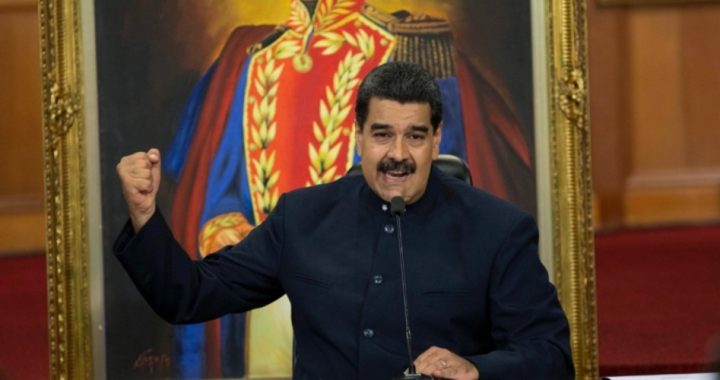
Days after the fraudulent election of mayors in Venezuela, Marxist dictator Nicolás Maduro (shown) banned the five mayors from the opposition party from taking office. He replaced them with party hacks, all but ending any opposition to his increasingly repressive regime. The election, in which 17 of the 23 mayoral races went to Maduro supporters, was widely criticized for being manipulated in order to give the country’s dictator the win.
Evidence that the election was fraudulent provided by the opposition is being ignored, with the head of Maduro’s National Electoral Council, Tibisay Lucena, calling the elections “impeccable,” adding that Venezuela “has the most perfect electoral system in the world.”
The phony election last Sunday was the last straw for Nathan Sandler, the co-founder of ICE Canyon, which trades in debt instruments issued by countries around the world. Wrote Sandler in his commentary at CNBC: “Venezuela has reached its breaking point.… Venezuela’s government crossed a critical inflection point…. The Maduro government is dismantling the last vestiges of democratic principles and institutions. Sunday’s local elections are the latest example of how far [his] government has moved from democracy.”
How is Maduro staying alive and in power? Sandler blames the global capital markets: “The global capital markets are providing the critical lifeline of liquidity and financial support to an increasingly totalitarian and repressive Maduro government.”
For example, in March Venezuela received a $300 million loan from the hedge fund Fintech Advisory using $1.3 billion worth of Venezuelan bonds as collateral. Two months later, Goldman Sachs took things further and loaned Maduro’s Marxist government $865 million, backed by $2.8 billion worth of Venezuela’s bonds.
In addition, Russia and China are helping keep Maduro afloat through “oil for cash” deals that fall outside any sanctions presently being applied to his regime.
And there’s the $1 billion-a-month purchase agreement between Big Oil and Maduro to keep their oil refineries on the U.S. Gulf Coast — which were specifically designed and built to refine Venezuela’s particularly dense and sticky crude — operating and Maduro in business.
That’s how Maduro has been able to make $6 billion in principal and interest payments so far this year to those international lenders at the expense of his poor and starving people.
Sandler thinks the United States’ present sanctions against Maduro and a dozen or so of his henchmen are completely ineffective, as well as the limited sanctions being applied to Wall Street. Those sanctions only restrict Maduro’s ability to issue new debt but grants “wide exemptions allowing normal trading in the underlying debt stock.” In addition, those sanctions only apply to Wall Street and not to Goldman Sachs or China or Russia or any other regime favorable to Maduro. And of course those sanctions can do nothing about the “oil for cash” deals being struck between Maduro and his international communist allies.
Sandler used to trade in Venezuelan debt securities until it became clear they were not only becoming increasingly toxic to investors, but they were helping keep Maduro in power. Now, says Sandler, “holding debt issued by the Venezuelan government or other government-sponsored entities [such as the state-owned oil company PDVSA] is providing significant support for a totalitarian regime that is inflicting human suffering on its population.”
Sandler goes even further, saying the United States should prohibit Wall Street from doing any trading in Venezuelan bonds whatsoever and turn off the cash spigot being provided by Big Oil through its purchases of Venezuelan crude. Sandler thinks additional sanctions on any U.S. businesses under contract with the Venezuelan government should be applied as well.
Sandler came up short of recommending embargoes of shipments of oil from Venezuela to its worldwide customers (as embargoes are usually seen as an act of war), hoping that these stepped-up sanctions, if enacted, would be enough to remove Maduro from power. Perhaps they will be enacted, and perhaps they will be enough.
Photo: AP Images
An Ivy League graduate and former investment advisor, Bob is a regular contributor to The New American magazine and blogs frequently at LightFromTheRight.com, primarily on economics and politics. He can be reached at [email protected].
Related article:



